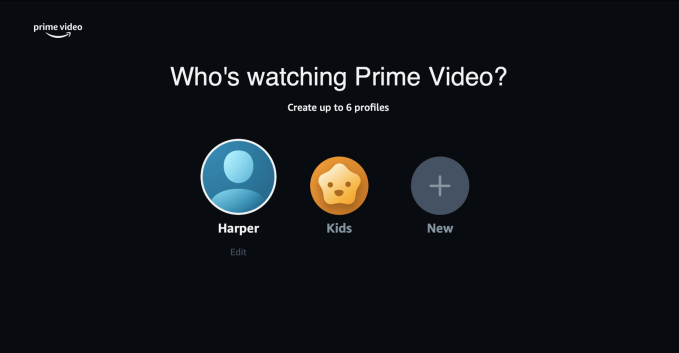
Amazon’s Prime Video is finally adding a feature that’s long since become a standard for streaming video services: user profiles. With profiles, Prime Video users will have access to their own Watchlist, personalized recommendations, and they’ll be able to track their own viewing progress, similar to rival services, like Netflix.
Customers can create up to six profiles for their household members, including one primary profile associated with the Amazon account, plus five additional profiles, which can be a mix of adult and kids’ profiles.
The new profiles will be first available in the Prime Video app on iOS, Android, Fire tablet (Gen 10 and higher), and the Fire TV Prime Video app, in addition to the Prime Video apps built for other living room devices.
Prime Video profiles were spotted earlier this year by NDTV, which led to some erroneous reporting that the feature had officially launched to all. In actuality, Amazon first rolled out profiles to its customers in India and Africa. It’s now making it accessible to all worldwide, including the U.S.

Image Credits: Amazon
For any profile set as a “Kids” profile, the service will only include age-appropriate content aimed at those 12-years-old or younger. The search results and search suggestions will also be filtered to only show Kids titles. Children with a Kids profile won’t be able to make purchases, either.
Meanwhile, any adult profile will be able to play all the entitled Prime Video content form the primary account, including content that has been purchased or rented, Prime Video titles, Prime Video Channels and Live content.
However, if the adult wants to set up parental controls on their account so this content is not accessible on a shared device, like the living room TV, they can do so. In this case, viewing restrictions will be enabled but parents can enter a PIN code to access the content, as they can now.
Parents can also continue to block children from making purchases from an adult profile by enabling Purchase Restrictions under Prime Video Settings, which will also require a PIN to complete the transaction.
The one exception to how child profiles work is on mobile devices. The Prime Video app will allow a child profile to access the adult profile’s downloads on mobile — a decision Amazon made because it didn’t want to restrict access to downloads if the device was taken offline, making it impossible to profile switch.
In addition, for customers that have set up wallet-sharing in their Amazon Household settings, Prime Video will automatically create profiles for those users. This can be disabled from the Manage your Profiles page, but once profile sharing is off, it can’t be reenabled.
The lack of user profiles have been, to date, one of the bigger oversights with Amazon’s Prime Video streaming service, first launched in 2011, and a much-requested feature for years. Today, streaming services don’t just compete on their content library but on how well they can surface the titles from that library by way of personalized recommendations and other tools that keep a user’s favorites and interests easily accessible. But Prime Video ignored this need, forcing all members of a household to share a single account. That choice told customers that even Amazon itself didn’t consider Prime Video a true competitor to other top services, like Netflix, Hulu and Disney+.
It’s finally correcting this matter, but only as the streaming market crowds with new offerings, like recently launched HBO Max and NBCU’s forthcoming Peacock, for example.
Amazon cautions that user profiles are being launched today, but not everyone will see them immediately. The feature is rolling out in phases, so you may see them arrive in a few days’ time, if not today.

